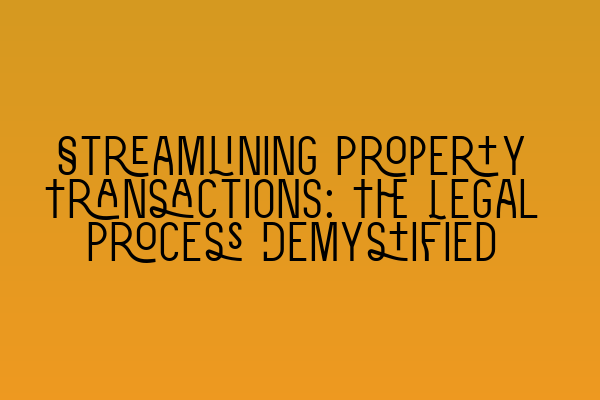Streamlining Property Transactions: The Legal Process Demystified
When it comes to property transactions, the legal process can often seem daunting and complex. However, by understanding the various steps involved and utilizing modern technology, it is possible to streamline the process and make it more efficient for all parties involved.
The Initial Stages: Instruction and Due Diligence
The first step in any property transaction is the instruction of a solicitor. This involves engaging a professional who specializes in property law to act on your behalf. Solicitors play a crucial role in ensuring that all legal requirements are met and that the transaction proceeds smoothly.
One of the key aspects of the initial stages is due diligence. This involves investigating the property and conducting searches to ensure that there are no underlying issues or restrictions that may affect the transaction. These searches may include checking the title deeds, local authority searches, and environmental searches, among others.
To streamline this process, solicitors now have access to online databases and technology that allows them to conduct searches more efficiently. By using digital platforms, solicitors can retrieve information quickly, saving time, and reducing delays in the transaction.
Contract Negotiations and Exchange
Once the due diligence stage is completed, the next step is contract negotiations. This involves negotiating the terms and conditions of the sale/purchase agreement, including the price, completion date, and any special conditions. Solicitors play a crucial role in ensuring that the contract reflects the agreed-upon terms and protects the interests of their clients.
Traditionally, contract negotiations involved multiple rounds of paper documentation, resulting in delays and a higher risk of errors. However, advancements in technology have allowed for the digitization of documents and the use of electronic signatures. This means that contracts can now be reviewed, amended, and signed electronically, reducing the time and effort required for this stage of the transaction.
Once the negotiations are finalized, the parties will exchange contracts. This is a crucial step in the process as it legally binds both parties to complete the transaction. Traditionally, this involved physically exchanging paper contracts, but now it can be done electronically with the help of secure online platforms.
Completion and Post-Completion
Completion is the final stage of the property transaction process. It involves the transfer of funds and legal ownership of the property from the seller to the buyer. This is typically done through solicitors who handle the financial aspects of the transaction and ensure that all legal requirements are met.
Post-completion, there are several tasks that need to be completed, such as registering the property with the Land Registry, arranging for the payment of Stamp Duty Land Tax (SDLT), and notifying relevant parties of the change in ownership. Technology has greatly simplified these tasks, allowing for online submissions and payments, eliminating unnecessary paperwork, and reducing delays.
Conclusion
By embracing technology and utilizing modern tools, the legal process for property transactions can be streamlined, making it more efficient for all parties involved. From conducting due diligence to contract negotiations and completion, technology has revolutionized the way property transactions are conducted.
At SQE Property Law & Land Law, we understand the importance of staying updated with the latest advancements in the field. Our team of experienced solicitors combines legal expertise with technological proficiency to provide our clients with a seamless and efficient property transaction experience.
If you’re preparing for the SQE exams or looking for practice exam questions and courses, please check out our related articles:
SQE 1 Practice Exam Questions
SQE 1 Practice Mocks FLK1 FLK2
SQE 2 Preparation Courses
SQE 1 Preparation Courses
SRA SQE Exam Dates
